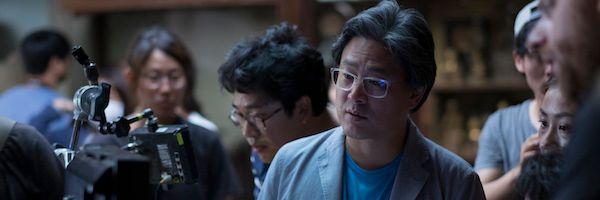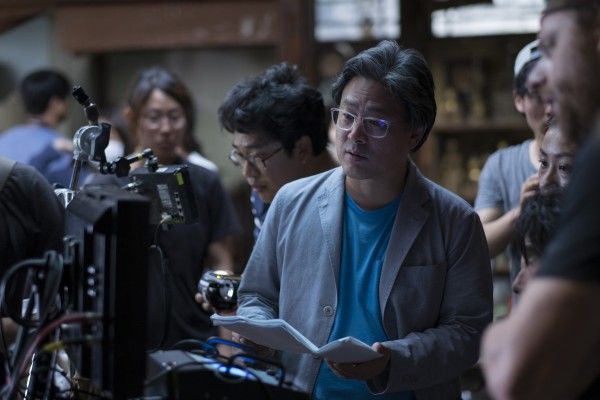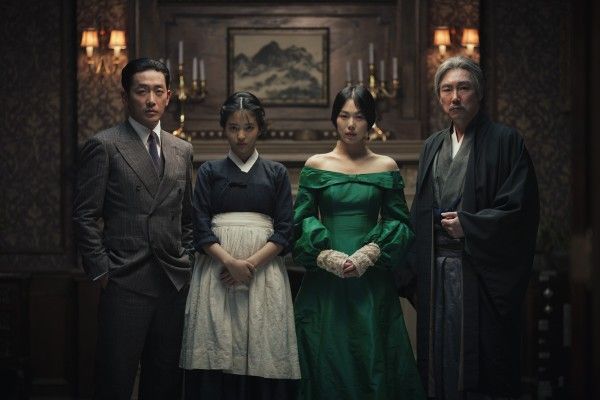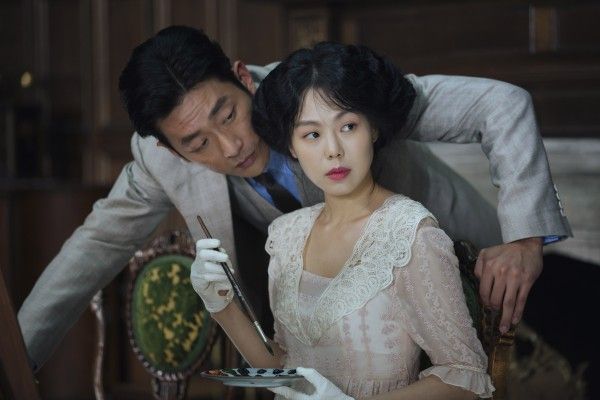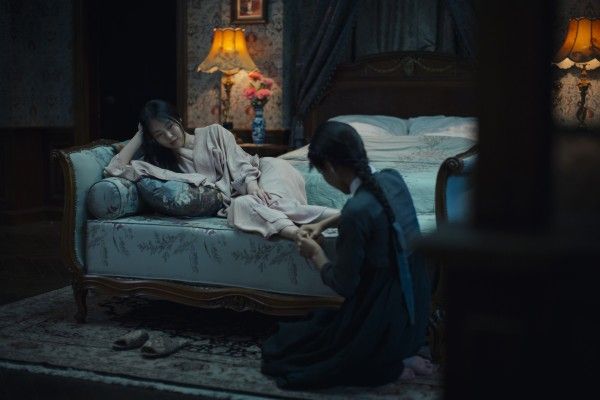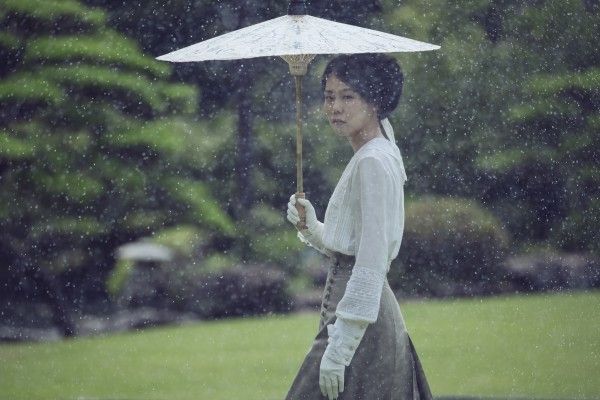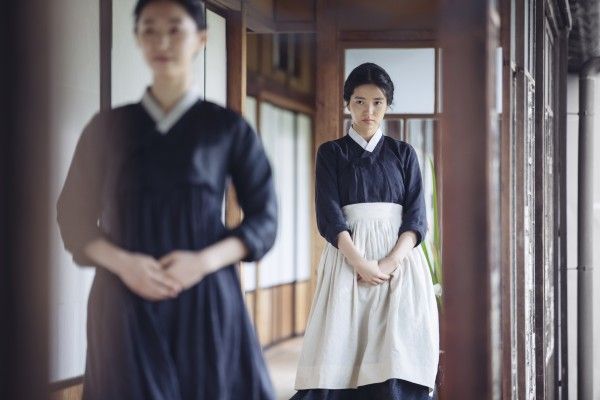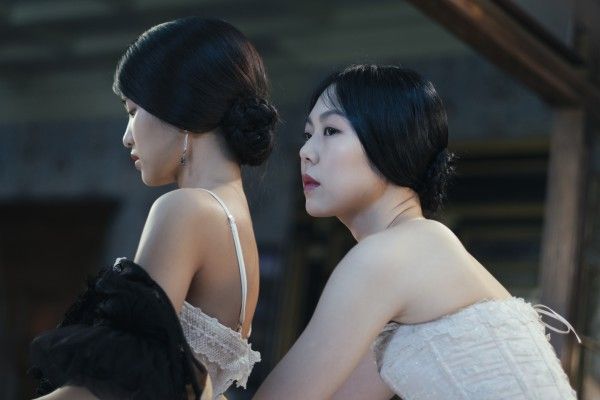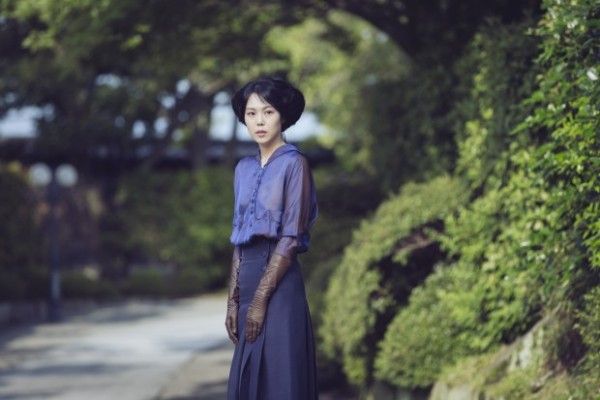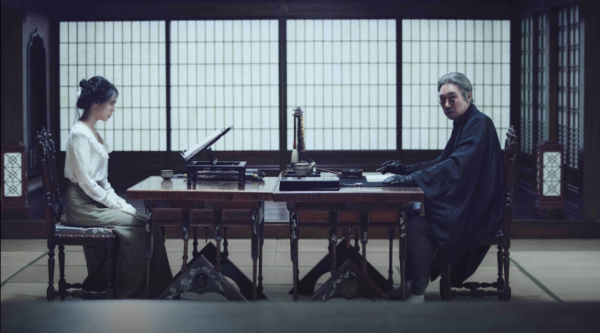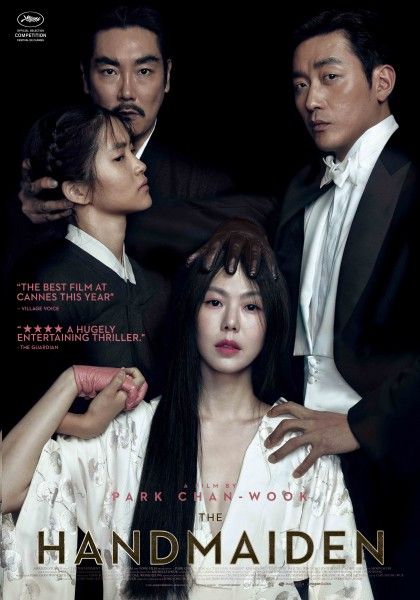As someone that sees a lot of movies, whenever I see a film that floors me with a surprise or two, I love it. The main reason is all too often, whatever twist or turn a director wants to do, chances are I’ve seen a version of it before and I often guess the twist before it happens.
So without going into too much detail about director Park Chan-wook’s The Handmaiden, who previously helmed Oldboy, Thirst, Stoker and Lady Vengeance, I’ll just say he’s crafted a fantastic crime drama that absolutely offers you a story you haven’t seen before. Trust me, if you want to see a fantastic film this weekend, go see this movie as it’s currently playing in limited release. As Matt says in his review:
The Handmaiden is best viewed knowing none of the twists and turns, and it’s a film I imagine will improve on repeat viewings. It’s thoughtful and complex while also being immensely entertaining, funny, dark, and disturbing. It’s the kind of masterful work we’ve come to expect from Park Chan-wook.
If you’d like to know more about the film, watch the trailer.
Shortly after seeing the film at this year’s Toronto International Film Festival I landed an extended interview with director Park. We talked about how developing Handmaiden, who he trusts for honest feedback, what kind of cameras he likes to use, how he spend two months storyboarding projects, future movies, his thoughts on superhero movies, if he’d like to develop something on TV, and a lot more. And for fans of The Handmaiden, director Park told me he’s releasing an extended version of the film in Korea due to fan demand and what it will include.
Check out what he had to say below.
Please note that since director Park Chan-Wook doesn’t speak English what you will read below is what his translator said.
COLLIDER: What kind of camera is that?
PARK CHAN-WOOK: Leica Q.
That’s funny, Michael Bay uses a Leica as a well. I see that I need to get a Leica. I am probably the first one to mention Michael Bay and your name together.
PARK: That’s funny.
First of all, thank you so much for giving me your time. Big fan of your work. I’m sure you hear that everyday. I would imagine with your track record whatever film you wanted to make after Stoker you could get the financing for. So what was it about this story and this movie that said I have to make it?
PARK: Well, it’s not necessarily true. He wasn’t able to get this film that he wanted to do financed. It was a western, and it’s not because of Stoker, but in any case, that one did not end up happening. To have come from Stoker, which is a female protagonist, he wanted to go on to do a film with male protagonists, this one being a western that he talked about. But because it didn’t come together, and to think that he will go on to do yet another film that has female protagonists, he felt well, “I’m doing another film with female protagonists,” so he wasn’t quite keen in the beginning.
From when you started developing Handmaiden to what people see on screen, how much changed along the way?
PARK: Well, he was thinking and from the inception to the finished film, there isn’t much difference because most of it, he decided how he was going to make his film right down to how he should end the film when he was reading the book. So even before he put down the book, he had the story for his film in his head already. Oh, one thing that he hadn’t decided was to transpose it to be a story that takes place in Korea. At first he thought that of course he is going to make this as a story that takes place in Victorian England in the 19th century. But only after he made the decision that, ”yes, I want to adapt this into a film,” he discovered that there is already a BBC miniseries. In that case, it will be repetitive to set it in the same Victorian England era. That being said, that if he had adapted the film to be set during that time, it will still be quite different from the BBC miniseries. Oh, and since it would’ve been in the English language it would’ve traveled better across the world and more audiences would be able to see it, in terms of English speaking audience. But to transpose it into a story that takes place in Korea during the Japanese occupied era in Korean history, he was able to add a lot more layers to the story, which in an artistic sense was a much more satisfying outcome.
I haven’t said yet, but I love the movie. And one of the things I love about it is that as someone who watches a lot of films many twists and turns happen that I was not expecting so well done. Which wasn’t really a question I just wanted to say it. I am curious though when you first finished the movie who are your friends and family that you show the first cut to for honest feedback?
PARK: His wife and his daughter.
So they are the first ones to see it?
PARK: Outside of the crew that are involved, yes.
What did you learn from your friends and family screening and your crew screenings that possibly impacted the finished film?
PARK: Well, there are small details, so I’m not sure if it’s worth mentioning. Well, one thing for example is the flashback to the den of criminals, the criminal family, comes into the film much earlier than he had written. So the audience finds out that Sook-hee as well as the Count are in cahoots, they’re scoundrels, they’re scheming, much earlier than he had written in the script. Now, that kind of change is something that he had implemented after friends and family feedback. But now that he has finished working on an extended edition...
Really?
PARK: The timing of the flashback went back to how he had originally written in the screenplay.
What extended edition?
PARK: In Korea, there are some fans who are very hardcore loyal fans around this film, The Handmaiden, this fandom has been created. This fandom has been strongly demanding that there needs to be an extended edition, anything that you have cut out, anything that you have left on the cutting room floor, we need to see. The investors they saw how well the film did at the box office and they agreed to have a extended version, and now there is one with 23 minutes of extra footage. Now, in Korea it had been available as a IPTV, pay-per-view TV in Korea as well, because there has been a phenomenal reaction to the film and the extended version that they have decided to have a limited release in a few numbers of screens in Korea even.
This happens in America sometimes they do these extended cuts…
PARK: Oh, and he was saying that for the audience here you might be able to see it in a Blu-ray. This fandom is so enthusiastic and so excited over the film so much so that fan magazine in Korea had done an article about these fans about this phenomenon that had happened.
I did not know about this extreme fandom but I’m in America. So I’ll ask you how long was your first cut of the movie?
PARK: Well, to answer that question he’ll have to explain to you this unique method in Korea that filmmakers subscribe to. What it is is that you have an on set editor who is somebody who is working alongside the crew on set of every film. So this person’s job is to be on set and with every take that had been shot. What she would do is she would look at the script as well as consult the storyboard, which filmmakers are prone to do before going to shoot, and the storyboard is basically a blueprint of the film from the beginning to end.
Totally.
PARK: And she would have these references and she would assemble the footage and if the director says, “Yeah, okay that’s a good take.” She would put that into sequence so that as the shoot goes on, she would assemble together this film per the script, per the storyboard. So on the last day of shooting on The Handmaiden her finished assemblage was 3 hours and 3 minutes long.
Oh, so after the extended cut it’s very close. Ten minutes? Fifteen minutes?
PARK: Well, twenty minutes out. Yeah, only about twenty minutes less than the final assembly.
I’m gonna jump back in time and talk about some of your previous films. As a fan I am very curious if there are a lot of deleted scenes from previous films that you’ve done that have not seen the light of day.
PARK: Not very many. He tends to create a storyboard before going in to shoot and shoots according to the storyboard. So that when it comes to his time in the editing suite there aren’t many that end up on the cutting room floor. So before The Handmaiden the only other alternative version of his film was Thirst where he can’t remember exactly what he called it, it may have been director’s cut or may have been the extended version edition, but either way Thirst was the only case where he had extended version, alternative version that’s in the Blu-ray as well. In the case of Thirst he definitely prefers the longer version. In the case of The Handmaiden he’s not sure they both have their pros and cons and very clear ones at that. Maybe the fans, these enthusiastic fans he mentioned, they probably prefer and love the extended edition over the released version. If you would ask him what you would recommend the first time audience seeing his film, he would actually recommend the released version.
Are you still shooting on film or have you switched to digital?
PARK: Well in Korea, you can’t shoot on film anymore the labs have all shut down.
So what cameras do you like to use?
PARK: He used the Alexa this time. It was good. And what he did was to use the 1970’s Hawk lenses. Now, these 1970’s anamorphic Hawk lenses, which they have recreated and put together, he got a very satisfactory result. Of course, he believes it’s the hard work put in by the lighting crew, as well as the post-production work that was done in the color correction process, but he is confident that this has a more film look than a film actually that’s shot on film.
I know a lot of filmmakers now that are taking what you just said, they’re taking digital cameras and they’re using 60’s or 70’s lenses to the digital device to try and create film with digital. Who did you get the idea to do this from? Is this something that you wanted to do? Had you seen this in other films?
PARK: He thinks that it must’ve been information shared by DPs that are working in America, because the DP that he usually works with he is working in Hollywood as well so he must have got the information.
Ah it’s spreading like a virus. I’m gonna ask a fun question or two and then we’re gonna get back to movies. What do you collect? If anything.
PARK: Cameras and lenses.
Do you have a big collection of just a few?
PARK: A medium size collection. Just to talk about cameras twenty-five, six, cameras and then a host of lenses.
Right now television has never been better than it is right now. Are there certain TV shows that you love? And is TV something that you’re interested in?
PARK: He’s aware that American TV is going through a great period right now but he doesn’t have quite the time to watch every one of them. He doesn’t have the required time to watch through every one of the so unfortunately he was only able to see first seasons of the TV series that he likes but those ones are The Wire, Mad Men, Game of Thrones and True Detectives and The Sopranos.
Those are all very good. Have you seen Breaking Bad?
PARK: Everyone says that he needs to go and see it but he hasn’t got around to it.
It is very good, but then again everyone says that. I am curious though jumping back into filmmaking, I know that you like to make storyboards and do everything prior. How much for you changes on set or are you very meticulous to those storyboards?
PARK: He stays almost true to the storyboard. It varies from film to film. He remembers I'm a Cyborg, But That's OK to be the film that he took the most liberty. Now if I'm a Cyborg, But That's OK was the case where he was creatively veering off from the storyboard, he veered off from the storyboard for a very different reason on Stoker. Stoker is probably the film where he veered off the most from what he originally storyboarded. And that was because he was storyboarding the film as he was used to doing as he would make a Korean film but he realized that the number of camera set ups that he had to go through every day was too much compared with the time he had to finish the film. Every night was spent with his DP in his room trying to reduce the number of camera setups for the next day’s shoot. Well there’s so little of shooting days to play with in America.
I’m curious how long do you typically spend developing your storyboards? Days? Months? Let’s start with that.
PARK: He thinks he spends two solid months and he hires storyboard artists to work with him And of course he’s somebody who he has been working together for long time now. He also has a DP sitting in on these sessions everyday and they will work together. Then they will bother the production designer who will be sitting next door and knock on her door quite often and tell her about this sort of camera movement or this sort of scene is what he’s thinking in his head. And she will reflect it in her designs and vice-versa, she will show him a rough sketch of her design, “this is what I’m thinking in terms of the set,” and if their department likes that, will inform the storyboard. It will get fine tuned and become more specific as well as being informed by location scout process as well. They will inform and make more detailed storyboard.
How long was the shoot for The Handmaiden? How many days?
PARK: Sixty-seven days.
Do you guys shoot five-day weeks or six-day weeks?
PARK: That’s a big difference. In Korea you can work like this, you can do ten day shoot and then have five days of downtime and then you could do a three day shoot and have a day of downtime. Rather than lump of the locations together, in Korea, filmmakers and production tend to approach it in a less strict way. So if need be, you can jump from one location and just travel over to another location and then come back. and that sort of thing. So it’s not out of the order to expect sort of irregular movements.
Did you enjoy the American system or did you find it constricting compared to what you’ve been used to?
PARK: Well, it’s really a matter of budget. And he understands he could see that, for American studio films, Stoker is on the lower end of the scale. So the restrictions that come are part and parcel to doing a smaller budget film. He could understand, and knew it was something that he had to contend with.
For the future, do you want to do more “American” movies?
PARK: Well, if he had his way he would love to go back and forth from one American to one Korean back and forth like that, but in life is there anything that goes your way?
When it comes to projects, some filmmakers I’ve spoken with have a drawer full of ideas, they have a million ideas, and some are focused on one thing and that’s it. And then when the project is done, they go to the next thing. How are you, are you developing all of these ideas or are you focused on one thing at a time?
PARK: It used to be the latter, but working that way he found it took too long to work on one film. To focus on one film, deliver it, and go through press like this and go through all that, and finish, and then start writing again, that approach is very time consuming and means you don’t make as many films. That’s why he thought, “well, maybe if I can get different writers to work on different projects I will be able to make more films in the same amount of time.” Also he used to be in the second category of directors who only had one idea in the drawer, but that was because in Korea if there is a film he wants to make, he tended to get financing for it so he didn’t have to worry so much about it. But if it was an American film, he finds it to be a different case, so he is now turning himself into a director of the second category, where there is more ideas in the drawer and he is developing them at the same time. He observes that the films that he’d like to make are some of the midsize films and maybe the lower budget sort of films. But in America, he observes that the market is being divided into two extremes that there are huge films and then there are tiny films. So these midsize films are getting less and less financing. For the sake of argument if he needs $10 million dollars for a certain project he gets told that there’s only market for $5 million dollar kind of film. Immediately there is a 5 million dollar gap from what he thinks he needs and from what the financer thinks that the film should be made with. These things take time and he understands that it’s not because he’s not the kind of director that’s in demand in America. Because it takes time to put together these projects he’s trying to get more projects started at the same time.
The superhero genre seems to be the most popular on the planet right now. Is that a genre that you’re interested in? Do you even like super heroes?
PARK: He has enjoyed quite a few. He doesn’t just write them off altogether. He thinks that the first two installments of the X-Men series by Brian Singer were absolutely superb.
Those were quite good. This is a fun question, I would imagine in Korea you are very well-known, so walking into a Starbucks people know you. Do you enjoy being anonymous in Toronto? I would imagine less people know who you are here.
PARK: You know, he really hates wearing baseball caps and baseball caps don’t even go well with the kinds of clothes that he likes to wear. Nevertheless he finds that in Korea he has to wear baseball caps so people won’t recognize him. But just to be able to walk around the street without a baseball cap he finds it to be, he likes it.
I have spoken to a number of people who are famous in Japan, or Moscow, or Paris and they love going to other parts of the world where it is more anonymous.
PARK: But then there is the other side of that too. For instance, a few years ago, was taking him around town in Toronto, and he was parked in a street park and the meter must’ve run out. The meter guy was writing a ticket it seemed so Adam rushed over to talk to the parking attendant. We were looking at it from across the street it just looked like he was getting a parking ticket and being handed over the ticket. Adam then proceeded to sign the ticket and returned it to the parking attendant. So we walking over and said, “Well how did it go?” and he said, “Well, he told me his wife is a big fan of mine and he wanted my autograph and so I gave him one and he let me go.” So there are good sides to being recognized.
Very much, especially at restaurants. For people who have never been to Korea if they’re going for a day or two, where should they go?
PARK: He would like to recommend the city of Pusan, [also known as Busan] where the famous Pusan International Film Festival takes place. He would also recommend the island of Jeju that’s the best place to be in all of Korea. Jeju Island he would like to recommend.
I did not go there I was in Seoul but no one told me.
PARK: You know what for a day or two, if you’re only spending a day or two in Korea and you have to be in Seoul, it’s difficult to go to Jeju. Jeju deserves it’s own at least three or four days.
When did you find out that Handmaiden got into Tiff? What does this film festival mean to you?
PARK: He talked to Giovanna [Fulvi] back in Cannes and was aware that they had a good mind to invite the film. So when it comes to film festivals, it’s difficult to really lump them all together and speak about it as one because there are so many different festivals and they each have their own characteristics and they differ from one to another. Speaking of bigger film festivals like Toronto film festival, Cannes film festival, it is a place where you can meet big numbers of the audiences and their big reaction to the film. It feels like places where films are respected and treated very well and they’re surrounded by big flamboyant events as well. Whereas there are smaller film festivals where if it weren’t for those festivals or the invitation you would never go to the cities where those film festivals take place, and yet they exude their own character and bring some attraction. Now, with Toronto film festival...so Toronto it’s a big festival. It’s not as formal as, say, Cannes film festival and you don’t have to necessarily attend the big flamboyant events where a tuxedo is a must, and it seems like many people are more casual and they’re able to therefore concentrate on the film more. That’s kind of more how it feels. But at the same time, having said, that Cannes film festival is great because of the formal events and the attitude towards films, where you feel like your films are being appreciated by these people who are getting dressed up, and there’s a show of that much respect towards the films. So it’s also a source and for them to get up and be enthusiastic about the film and celebrate cinema together in it’s own way it is a moving experience. So there is this different character but he appreciates the different characters of these two film festivals but he likes Toronto for the more casual nature of it, he appreciates that about Toronto.
Getting back into a filmmaking question, some directors like the Clint Eastwood method of shooting the rehearsal and doing two takes and that’s it and moving on. Some directors like the David Fincher method of fifty takes or more just keep on going. What do you like to do as a director?
PARK: He thinks he’s somewhere in the middle. He does less than ten takes in any case, around seven takes on average.
What is the most you’ve ever done?
PARK: On The Handmaiden, it’s a deleted shot in the released version but it did make it into the extended edition, but the thing is it’s got nothing to do with the actors performance he’s not even sure if it’s worth mentioning…
It’s a technical thing?
PARK: Sook-hee is supposed to flip a coin toward the camera. It had to have a particular trajectory toward the camera to get it right, it was a tricky thing. So to get it right there was 160 takes. But he wasn’t even there for it because it was a second unit shot.
So what is the most takes you’ve done with actors?
PARK: So it was in Oldboy, when the villain, the character of Lee Woo-jin. So he reveals all the truth to the protagonist Choi Min-sik’s character and Choi Min-Sik is mentally broken down he can’t deal with this shocking secret and Woo-Jin leaves him like that as he gets into the elevator the door closes and he commits suicide inside the elevator. So there was a close up of Lee Woo-Jin’s face as he has this bitter smile on his face and the elevator door closes on him. So that close up he can’t remember the exact number of take,s but it must’ve been around thirty takes.
Okay so my last question. I have to ask as a fan, what are you doing next?
PARK: Well he’s hoping for everything to come together so he can do this as his next project and that is a film called The Ax.
The X or The Ax?
PARK: The Ax as in you get axed.
Yeah, a-x-e.
PARK: It’s based on a Donald Westlake novel of the same title.
Korean or American?
PARK: American.
Interesting. I will leave it there and say, thank you.
PARK: Thank you.

